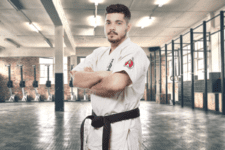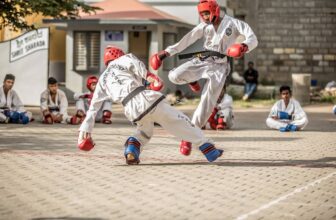So just how long does it take to get a black belt in karate?
Generally, it takes around 5 years of dedicated training to achieve a black belt in karate. But that timeline can vary depending on factors such as strength, dedication, and training goals.
How long it takes to get a black belt in karate depends on:
- Being physically strong allows for more intense and frequent training, enabling individuals to progress more quickly.
- Dedication is crucial in achieving a black belt. Consistent training and a strong work ethic are necessary to overcome challenges and push through plateaus.
- Having clear goals and mini-goals along the way can help maintain motivation. Breaking down the journey into manageable steps provides a sense of accomplishment and progress.
- Regular grading tests are conducted to assess the student’s progress and improvement. These tests serve as milestones and provide valuable feedback from instructors.
- Consistency and attendance in karate classes are important for promotion. Regular and uninterrupted training helps students hone their skills and master techniques.
- Mental toughness and resilience are also important skills to develop on the path to a black belt. Karate requires mental strength to overcome obstacles and push through physical and mental fatigue.
- Training outside of the dojo is often emphasized for faster progress. Engaging in additional practices, such as solo training and conditioning exercises, can enhance skills and abilities.
- Recording progress and reviewing techniques can be highly beneficial. By documenting their journey and consistently reviewing techniques, students can solidify their learning and improve their performance.
Ultimately, achieving a black belt in karate requires time and patience. It is a journey that requires dedication, perseverance, and a willingness to continuously learn and grow.
What it Takes to Get a Black Belt in Karate
When it comes to obtaining a black belt in karate, several factors influence the duration of the training. These factors include:
- Physical strength
- Dedication and goal setting
- Grading tests and promotions
- Consistency and attendance
- Mental toughness and resilience
- Training methods and progress tracking
Physical Strength and Training
Physical strength plays a crucial role in the duration of karate training. Being physically strong allows for more intense and frequent training sessions, enabling practitioners to progress faster.
A solid foundation of physical strength contributes to improved technique execution and overall performance.
Increase in physical strength:
- Strength training exercises
- Regular cardiovascular workouts
- Functional movements and flexibility drills
Dedication and Goal Setting
Dedication is a key factor in achieving a black belt in karate. It requires consistent effort over an extended period of time.
Setting clear training goals and mini-goals help maintain motivation throughout the journey. By having a clear roadmap and specific targets, practitioners can measure their progress and stay focused.
Effective goal setting:
- Create long-term goals (black belt achievement)
- Break down goals into smaller, manageable targets
- Regularly assess progress and make necessary adjustments
Grading Tests and Promotions
Regular grading tests are conducted to assess practitioners’ progress and improvement. These tests allow instructors to evaluate the students’ technique execution, understanding of karate principles, and overall performance.
Promotion to the next belt level is awarded based on the individual’s performance during grading tests.
- Grading tests occur at regular intervals (usually every few months)
- Students are required to demonstrate a specific set of techniques and skills
- Feedback is provided to identify areas for improvement
Consistency and Attendance
Consistency and attendance in karate classes are essential for promoting steady progress. Regularly attending classes ensures continuous learning and allows practitioners to develop muscle memory.
The more consistently one trains, the more quickly they can master techniques, enabling progress towards earning a black belt in a shorter timeframe.
Importance of consistency:
- Avoiding long breaks between training sessions
- Attending classes regularly (minimum recommended attendance)
- Practicing outside of scheduled class times
Mental Toughness and Resilience
Mental toughness and resilience are important skills to develop during the journey to a black belt. Karate training can be physically and mentally demanding, requiring practitioners to push through obstacles and setbacks.
Developing mental fortitude helps overcome challenges and ensures long-term commitment to training.
Building mental toughness:
- Practice mindfulness and visualization techniques
- Set realistic expectations and acknowledge progress
- Develop a positive mindset towards challenges and failures
Training Methods and Progress Tracking
In addition to regular class attendance, training outside of the dojo is emphasized for faster progress. Practicing outside class hours allows for additional repetition and refinement of techniques.
Recording progress and reviewing techniques regularly through video analysis or journaling helps solidify learning and ensures continuous improvement.
Effective training methods:
- Consistent practice outside of class hours
- Record and review training sessions to identify areas for improvement
- Seek feedback from instructors or experienced practitioners
The answer to the question of how long does it take to get a black belt in karate depends on the time you spend, your dedication, and ability to memorize and retain your knowledge.
While the typical timeline is around 5 years, individual factors such as physical strength, level of commitment, and training goals can influence the duration.
By focusing on developing physical and mental attributes, setting clear goals, and maintaining consistency and attendance, practitioners can embark on a fulfilling journey towards earning their black belt.
- Consistency is key: To earn a black belt in karate, commit to regular training sessions. Aim for a consistent practice schedule that allows you to consistently build upon your skills and knowledge.
- Set realistic expectations: Understand that achieving a black belt in karate is a long-term journey that requires dedication and effort. It typically takes several years of training to reach this level, so be patient and stay focused on your progress rather than solely focusing on the end goal.
- Embrace the process: Earning a black belt is not just about mastering techniques, but also developing discipline, mental strength, and self-confidence. Embrace the lessons and challenges that come with the journey, as they will shape you into a well-rounded martial artist.
- Seek guidance from a qualified instructor: Having a skilled and experienced instructor is crucial for your progress. They will provide proper guidance, correct mistakes, and challenge you to improve. Trust in their expertise and follow their instructions to accelerate your journey towards a black belt.
- Maximize your training: Make the most of your training sessions by setting specific goals and consistently pushing yourself to improve. Utilize any available resources, such as attending seminars, participating in competitions, practicing with kick shields, and cross-training in other martial arts, to enhance your skills and knowledge in karate.







